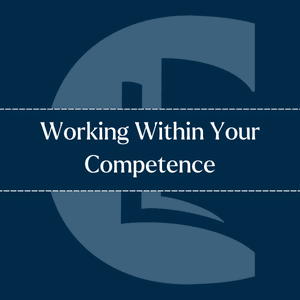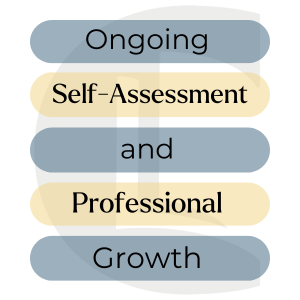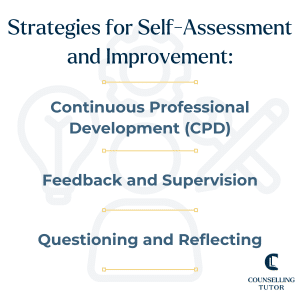Working Within Your Competence in Counselling and Psychotherapy
Maintaining professional competence is crucial to ensuring effective and ethical practice in counselling and psychotherapy. This article explores the concept of competence, the ethical obligations surrounding it, and strategies to self-assess and enhance your skills. It also highlights the dangers of overestimating your abilities and the importance of Continuous Professional Development, and working within your competence in counselling practice.

This comprehensive understanding and reflection on working within your competence is vital for all counselling professionals, ensuring you can provide effective and ethical support to your clients.
Learning Outcomes
By the end of this article, you will:

- Understand the definition and importance of competence in counselling.
- Recognise the signs of working outside or at the limits of your competence.
- Learn strategies for identifying and addressing gaps in competence.
- Appreciate the significance of continuous learning and self-assessment.
Understanding and Maintaining Professional Competence
Definition and Ethical Frameworks
Competence in counselling is defined as possessing sufficient knowledge, judgement, skill, or strength to perform a particular duty. The National Counselling and Psychotherapy Society emphasises the importance of providing services only in areas where practitioners are trained and competent, can recognise limitations, and are prepared to refer clients when necessary.
Similarly, the British Association for Counselling and Psychotherapy (BACP) outlines the need to work within your competence, which includes continuously evaluating whether you have the necessary skills, knowledge, and judgement to offer competent care. This ethical responsibility underscores the need for ongoing self-assessment and professional growth.

The Dunning-Kruger Effect and Its Implications
A critical concept of competence is the Dunning-Kruger effect, a cognitive bias where individuals with limited knowledge or competence in a domain overestimate their abilities. This phenomenon can lead to practitioners making erroneous judgements without realising their incompetence, thus potentially harming clients.
The impact of the Dunning-Kruger effect is often compounded by what is referred to as the “dual burden”—the combination of overestimating your skills and being unaware of this misjudgement. This effect can result in counsellors and psychotherapists continuing to work outside of their competence, thinking they are capable when they are not.
Click Here to Download Free Handout
Strategies for Self-Assessment and Improvement
To mitigate the risks associated with the Dunning-Kruger effect and ensure ongoing competence, several strategies are recommended:

- Continuous Professional Development (CPD): Engaging in CPD activities, such as workshops and additional training, is essential for staying current with new practices and theories in the field. This proactive approach helps fill knowledge gaps and refine skills.
- Feedback and Supervision: Regular supervision and peer review are vital for gaining insights into your practice. Feedback from supervisors and colleagues can help identify blind spots and areas needing improvement. The role of a “critical friend” in this context is to provide constructive feedback that highlights both strengths and areas for development.
- Questioning and Reflecting: Counsellors and psychotherapists must continually question their knowledge and skills. This involves reflecting on your practice, being open to new learning, and adapting to changes. It’s important to recognise that what is considered best practice today might evolve; having a flexible and adaptive approach is crucial.
Case Example: A Lesson in Humility
An illustrative example is an American police officer who, while demonstrating gun safety to a class of children, unintentionally injured himself. The officer confidently declared, “I am the only person in this room professional enough to carry this Glock 40 (hand gun),” before accidentally shooting himself in the leg. This incident starkly demonstrates the disparity between perceived and actual competence. The officer’s overconfidence made him make a critical error, highlighting the dangers of assuming competence without sufficient self-awareness or skill assessment.
This case powerfully reminds us of the importance of humility and continuous learning in professional practice. It underscores that even those who appear highly competent can make mistakes and emphasises the need for ongoing self-assessment and openness to learning.
Free Handout Download: Working Within Your Competence
Final Remarks
This discussion has outlined the importance of working within your competence in counselling and psychotherapy. Practitioners must regularly evaluate their skills and knowledge, engage in continuous professional development, and seek feedback to ensure they provide their clients with the best possible care. The learning journey in trauma-informed practice and other areas is ongoing, with new insights and techniques emerging continuously.
References and Further Reading
BACP (2018). Ethical Framework for the Counselling Professions [Online]. Lutterworth: BACP. Available from: <https://www.bacp.co.uk/events-and-resources/ethics-and-standards/ethical-framework-for-the-counselling-professions/>
Darwin, C. (1871). The Descent of Man. London: John Murray.
Kruger, J., & Dunning, D. (2000). “Unskilled and Unaware of It: How Difficulties in Recognizing One’s Own Incompetence Lead to Inflated Self-Assessments.” Journal of Personality and Social Psychology, 77(6), pp. 1121–1134.
Lepkowski, W. J., & Packman, J. (2006). “Can Counselors Learn to Accurately Assess Their Skills? A Study of Counselor-in-Training Self-Assessments.” American Counseling Association. Available from: American Counseling Association.
Merriam-Webster. (n.d.). Competence. Available from: Merriam-Webster Dictionary.
NCPS (2018). Code of Ethical Practice [Online]. Available from: https://ncps.com/about-us/code-of-ethics